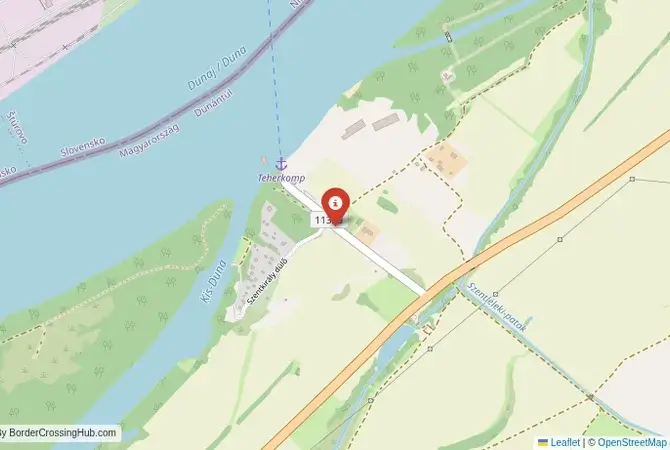
Approximate Border Location
Wait Times
15-60 min for freight
Operating Hours
Open 6:00 AM – 8:00 PM
Crossing Types
Freight
Border Type
Land crossing via ferry
Peak Times
Mornings (7-10 AM)
Daily Crossings
~500 vehicles
Currency Exchange
Available near Štúrovo (EUR, HUF)
Safety Information
River hazards
Languages Spoken
Slovak/Hungarian
Accessibility Features
Ramps, limited assistance
About Esztergom (freight ferry) & Štúrovo
A Bridge with a View
The border crossing connecting the Slovak town of Štúrovo with Esztergom in Hungary is one of the most iconic and visually stunning in all of Europe. This is not just a border; it is a journey across the magnificent Mária Valéria Bridge, with a breathtaking, postcard-perfect view of the Esztergom Basilica, the largest church in Hungary, perched on a hill overlooking the Danube River. Since both Slovakia and Hungary are members of the European Union and the Schengen Area, there are no permanent border controls. To cross here is to travel between two historically linked cities, a seamless passage that is as much a cultural and aesthetic experience as it is a simple act of transit.
Operational Details
This checkpoint connects Slovakia’s Nitra Region with Hungary’s Komárom-Esztergom County. The Mária Valéria Bridge is a major international crossing, open 24/7 to passenger cars, buses, pedestrians, and cyclists. It is important to note that there is a weight restriction, so the heaviest freight trucks must use other crossings like Komárno-Komárom. The former border posts are now abandoned. Traffic flows freely, and the bridge is a popular spot for tourists to walk across to enjoy the spectacular views. The crossing has completely reintegrated the two cities, which now function as a single tourist and economic area.
Before Crossing
Crossing borders gets messy sometimes, think political flare-ups or gates shutting fast. Good travel insurance is a must for handling doctor visits, trip disruptions, or security scares. Don’t get caught unprepared. To find a policy that’s got your back, check out reliable plans today for peace of mind.
A History of Destruction and Rebirth
The history of this crossing is a dramatic story of destruction and reunification. The original Mária Valéria Bridge, named after the daughter of Emperor Franz Joseph I, was opened in 1895. It was a vital link for the region. However, it was destroyed by retreating German troops in 1944. For the entire duration of the Cold War, and for more than a decade after, the two cities stared at each other across the Danube, connected only by a slow ferry. The ruined pillars of the bridge stood in the river as a sad and powerful symbol of a divided Europe. After years of negotiations and with significant funding from the European Union, the bridge was faithfully reconstructed and reopened in 2001. The event was a massive celebration, a symbol of the healing of old wounds and the reunification of the continent.
The Seamless Border Procedure
Today, there is no border procedure for travelers. You simply drive, cycle, or walk across the bridge, pausing to take in the magnificent view. There are no passport checks and no customs inspections. This is the reality of the Schengen Area. However, it is important to remember that both Hungarian and Slovak police and customs authorities can and do perform random checks on vehicles anywhere in their territory. You are still required to carry a valid passport or national ID card with you at all times. The experience of walking from one country to another in the space of ten minutes is a powerful testament to modern Europe.
The Surrounding Region: Hungary Side
On the Hungarian side, Esztergom is one of the most historically significant cities in the country. It was the first capital of the Kingdom of Hungary and the birthplace of its first king, St. Stephen. The city is dominated by the monumental Esztergom Basilica, which sits atop Castle Hill. The complex also includes the remains of the medieval royal palace and a major Christian art museum. The city has a charming baroque old town and is the gateway to the beautiful Danube Bend, a scenic and historic region where the river turns south towards Budapest.
The Surrounding Region: Slovakia Side
On the Slovak side, Štúrovo (Párkány in Hungarian) is a town whose modern identity is closely linked to Esztergom. It is known for its large thermal spa and resort, Vadaš, which is one of the most popular in Slovakia. The town offers stunning views of the Basilica across the river and has a pleasant riverside promenade. It is the cultural center of the Hungarian minority in this part of Slovakia. The surrounding area is part of the Podunajsko wine region.
Practical Travel Information
Practical planning for this route is very simple. The most important thing is to have the required motorway vignettes if your journey involves motorways in either country. Both Slovakia and Hungary use an electronic vignette system, which must be purchased online in advance. The official currencies are the Euro (EUR) in Slovakia and the Hungarian Forint (HUF) in Hungary. Both cities offer all necessary services. The bridge is a popular destination in itself, and there is ample parking on both sides for those who wish to explore on foot.
Final Considerations
The Štúrovo–Esztergom border crossing is more than just a bridge; it is a symbol of reconciliation and a premier tourist destination. The journey across the Mária Valéria Bridge is one of the most beautiful border crossings in Europe. The seamless passage has completely revitalized the two cities, creating a vibrant cross-border region. It is a place where history, architecture, and natural beauty come together, a powerful and uplifting testament to the ability of nations to rebuild the bridges of the past to create a shared future.
No reviews yet.
